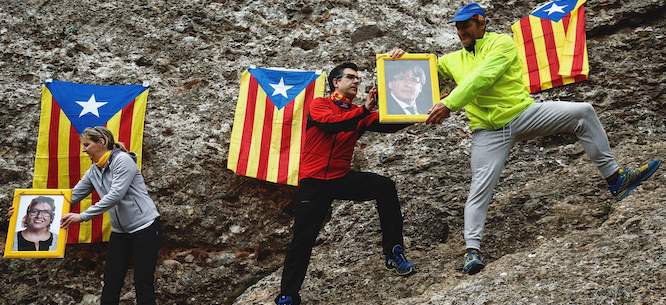The Rebellion in Catalonia
The Rebellion in Catalonia
The militant, nonviolent movement for Catalan self-determination will shape the future of Spanish politics.

The future of Spanish politics depends to a large degree on events in Catalonia, the nation’s richest and most rebellious region. Pedro Sánchez, leader of the nation’s social-democratic party, the PSOE, became prime minister of Spain in January, as head of a coalition of left-wing parties. But his success at governing with a majority of just two votes rests on the support of Catalan delegates in the Cortes, Spain’s national legislature, and their leaders are either in jail or exile.
To understand the dilemma, it is necessary to go back in time. Before 2010, the goal of Catalans was autonomy rather than independence. The region had enjoyed considerable autonomy under the Second Republic, which Franco abolished after he won the Spanish Civil War. Catalans only regained a measure of self-government—and the right to use their own language in public—after Franco’s death in 1975.
The subsequent Transition (which Catalans always capitalize) to democracy was a compromise between the winning and losing sides of the Civil War. It cast a veil of amnesia over much of the previous half-century, including the crimes of the dictatorship, and left much of the Francoist elite intact.
Most Catalans accepted the new constitution, which partially restored the autonomy they had achieved in the 1930s. But most regarded it as a point of departure rather than a final destination. The millions of immigrants who flooded into Catalonia from the rest of Spain in the 1960s and 1970s were generally unconcerned with the issue of autonomy, despite earnest (and occasionally successful) efforts to convert them.
In 2006 a left-wing government in the region won from the central government in Madrid a new statute of autonomy with somewhat enhanced powers and explicit recognition of Catalonia as a “nation” within a looser Spanish federation. But, in 2010, that statute was gutted by Spain’s Constitutional Court. It was this reversal, along with other encroachments on what Catalans considered their cultural rights and economic interests, that triggered the current movement for secession, which came to be known simply as the Procés (Process).
Catalans concluded that the Spanish government would never grant them true autonomy without a serious fight. Thus, over the past decade, demonstrations demanding independence have drawn crowds ranging from 100,000 to over a million. Counter-demonstrations by unionists have occurred, but on a considerably smaller scale.
In 2017, the Procés culminated in an illegal referendum, which the Spanish police tried first to prevent and then to disrupt, followed by an abortive “declaration of independence” that provoked the Spanish government to arrest or drive into exile the leaders of the Procés and temporarily suspend Catalonian autonomy.
The Catalan parliament’s declara...
Subscribe now to read the full article
Online OnlyFor just $19.95 a year, get access to new issues and decades' worth of archives on our site.
|
Print + OnlineFor $35 a year, get new issues delivered to your door and access to our full online archives.
|






